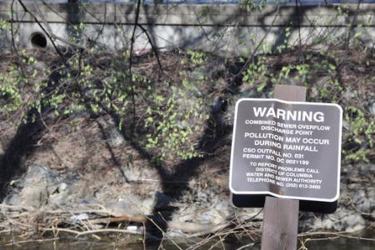House Committee Makes Down Payment On Clean Water Needs
By Becky Hammer, NRDC

The House Transportation & Infrastructure Committee is moving forward with a measure that would invest $3.7 billion in critical wastewater and stormwater infrastructure. These resources — while a drop in the metaphorical bucket compared to the hundreds of billions of dollars needed to fix our clean water systems — will help communities across the country struggling with sewage spills, inadequate sanitation, and destructive urban flooding.
It’s essential that this investment level be maintained or increased as the bill advances.
The water provisions in the bill include:
- Grants to eliminate combined sewer overflows. More than eight hundred communities around the country are served by “combined” sewer systems that become overwhelmed and spill raw sewage into homes and local waterways during rainstorms. These spills contain pathogens that can cause infections and other health problems in anyone who is exposed to them, not to mention metals, sediment, chemicals, and debris that pollute rivers and streams. The T&I bill includes $2 billion for grants to help communities upgrade their infrastructure to stop sewer overflows and capture contaminated runoff. Half of this amount would be reserved for “financially distressed” communities.
- Funding for on-site sanitation systems for low-income households. A half-million households across America — from rural Alabama to the suburbs of St. Louis — lack adequate sanitation, leaving families exposed to untreated sewage in their own yards and homes. Black, Latino, and Indigenous communities are more likely to lack access to wastewater treatment. The T&I bill tackles this environmental injustice and humanitarian crisis by providing $450 million for a new low-income household decentralized wastewater grant program. However, it’s important to note that the funding is not contingent on the provision of warranties for treatment systems installed under the program, as advocates have urged.
- Technical assistance and workforce development grants. Many communities are unable to access federal infrastructure funding because they lack capacity to prepare the necessary plans and application materials. At the same time, workers needed to carry out wastewater and stormwater infrastructure projects are in short supply. The T&I bill includes $495 million for technical assistance and workforce development grants that will make federal funding opportunities more accessible and create good jobs.
- Wastewater grants for Tribes and colonias. Tribal communities and colonias along the U.S.-Mexico border disproportionately lack access to sanitation and clean water. The T&I bill provides $500 million for Tribal wastewater grants and $125 million for colonias. This funding is badly needed to help communities that have been underserved for too long.
Much of this funding is conditioned on the grant recipient taking steps to avoid or mitigate the impacts of climate change on the funded project. This is a common-sense requirement given the many threats that wastewater and stormwater infrastructure face from climate change, from increased combined sewer overflows to failing septic systems and more frequent flooding.
It’s critical that these funding levels be maintained or increased in the final legislative package. These investments are long overdue, but — combined with the resources provided in the Senate’s bipartisan infrastructure package — they nonetheless fall short of meeting the true need that our communities face.
The bipartisan Senate bill provided around $11.7 billion for the Clean Water State Revolving Fund, the nation’s largest dedicated source of wastewater and stormwater funding. But the EPA estimates that we need to invest at least $271 billion in maintaining and repairing our clean water infrastructure over the next twenty years just to meet current environmental health standards — a figure that is now outdated and almost certainly an underestimate. That’s why NRDC and other environmental advocates have been asking for $110 billion in total federal funding for wastewater and stormwater programs over the next decade.
The T&I bill provides a down payment on the resources ultimately needed to ensure that all people in this country have access to clean water, working sanitation, and protection from flooding. We need a historic investment on par with the much-needed influx of funds Congress is directing to drinking water systems. As negotiations continue, Congress must ensure that these important wastewater and stormwater programs do not get shortchanged.
Becky Hammer is Deputy Director of Federal Water Policy for the Natural Resources Defense Council (NRDC) and Senior Attorney for NRDC's Nature Program.
